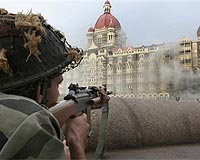| . |  |
. |
Helmand Province, Afghanistan (AFP) July 2, 2009 US Marines launched a major offensive into the Taliban heartlands of southern Afghanistan before dawn Thursday as President Barack Obama's new war plan swung into action. With dozens of aircraft ferrying out troops from various bases, the assault aimed to insert forces into insurgent strongholds in Helmand province in what officers said was the biggest offensive airlift by the Marines since Vietnam. Operation Khanjar (Strike of the Sword), involving nearly 4,000 US forces as well as 650 Afghan police and soldiers, would bring security to the Helmand River valley ahead of presidential elections on August 20, commanders aid. It was the Marines' first major operation since they deployed over the past few months as part of 21,000 US reinforcements pledged by Obama in a revised US strategy to turn the tide on a dragging conflict with the Taliban. A fleet of helicopters lifted about 300 soldiers from a camp called Dwyer at dawn with their commander confident they would have cleared a key road, secured a bridge and met with villagers by evening. "I told my men everything they have done to prepare for this operation means they are ready to go," said Captain Junwei Sun, 39, commanding officer of 2/8 Battalion's Fox company. Afghan security forces were driving out to their targeted area, where the forces would meet, he said. "We expect to encounter resistance and come into enemy contact," the captain added. The first highly aggressive phase of the operation was set to last 36 hours, commanders said. "What makes Operation Khanjar different from those that have occurred before is the massive size of the force introduced, the speed at which it will insert," Brigadier General Larry Nicholson said. Troops would hold areas they take until they could transfer security responsibilities to Afghan forces, the commander of the Marine Expeditionary Brigade said in a statement announcing the launch of the assault. The troops were to push south down the Helmand River valley, deep into insurgent-held areas where international forces have failed to establish a presence despite ousting the Taliban from power in 2001. Military commanders said Operation Khanjar would convince local people that the Afghan security forces -- backed by international troops -- offered them a better long-term future than the Islamist hardliners. "This is a big, risky plan," Nicholson told his men at a briefing at Camp Leatherneck in the run-up to the launch of the battle. "It involves great risks and amazing opportunities. These are days of immense change for Helmand province. We're going down there, and we're going to stay -- that's what is different this time." Reflecting the new US strategy, he stressed that the security needs of Helmand's residents came before killing Taliban. "One of the most critical things is to tell people why we're there, and we are going to have a limited opportunity to gain their trust," Nicholson said. "Our actions will allow voter registration in areas where there has been none," he told commanders and embedded reporters. Key targets of the air and land assault include the districts of Garmsir and Nawa which are towards the southern border with Pakistan, where many of the insurgents are said to take refuge and produce the opium that funds militants. Officers walking through the battle plan on a large floor map said they expected to find 300-500 Taliban fighters in Nawa district. They also spoke of the key role that would be played by teams clearing roads of improvised explosive devices -- favoured weapons of the militants. Unmanned aerial surveillance would keep watch overhead while loudspeakers would keep local people informed, they said. Brigadier General Muhayadin Ghori, the senior Afghan general involved in Operation Khanjar, told the same briefing that he was hopeful of success. But he warned that any repeat of the civilian casualties that have undermined the international military's reputation among Afghans would be disastrous. "One casualty of a child will give everyone a bad name," he said. "We should give priority to civilian casualties and then look after our own wounded soldiers." Share This Article With Planet Earth
Related Links News From Across The Stans
 Mumbai gets India's first regional base for anti-terror troops
Mumbai gets India's first regional base for anti-terror troopsMumbai (AFP) July 1, 2009 India's first regional unit for specialist anti-terror troops has opened in Mumbai, fulfilling a government pledge after criticisms of the military's slow response to last year's attacks on the city. The hub for some 250 National Security Guard (NSG) commandos, opened by Home Minister P. Chidambaram on Tuesday evening, is the first of four new centres across the country. The others in ... read more |
|
| The content herein, unless otherwise known to be public domain, are Copyright 1995-2009 - SpaceDaily. AFP and UPI Wire Stories are copyright Agence France-Presse and United Press International. ESA Portal Reports are copyright European Space Agency. All NASA sourced material is public domain. Additional copyrights may apply in whole or part to other bona fide parties. Advertising does not imply endorsement,agreement or approval of any opinions, statements or information provided by SpaceDaily on any Web page published or hosted by SpaceDaily. Privacy Statement |